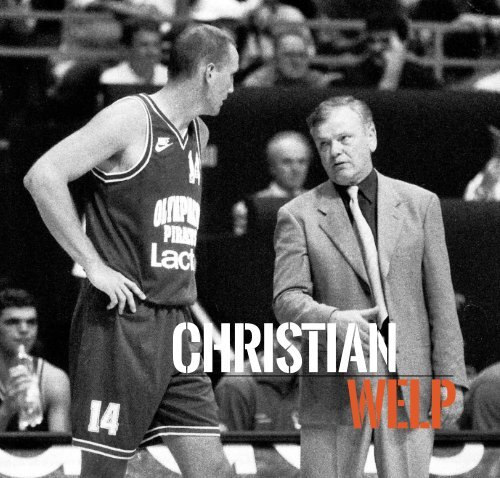Create successful ePaper yourself
Turn your PDF publications into a flip-book with our unique Google optimized e-Paper software.
Christian<br />
Welp<br />
391
A double<br />
Euro-champ<br />
Every player dreams <strong>of</strong> an important game<br />
with a close score being decided by his basket<br />
in the last seconds. Many dream about<br />
it, but few can say they actually lived that<br />
kind <strong>of</strong> experience. Christian Welp – who<br />
was born on January 2, 1964, in Delmenhorst,<br />
Germany and passed away on March 1, 2015, in<br />
Seattle, Washington – was one <strong>of</strong> them. He scored the<br />
most important points <strong>of</strong> his career during EuroBasket<br />
1993 in his native Germany.<br />
The opponent in the title game was Russia, the big<br />
favorite against a German team that had already made<br />
a surprise run by reaching that final. However, the<br />
hosts wanted more. Down the stretch, the Russians led<br />
63-68, but soon the score was tied at 68-68. A foul by<br />
Michael Jackel over Sergei Babkov allowed the Russians<br />
to jump ahead again, 68-70. German coach Svetislav<br />
Pesic called for a play for Welp. Kai Nurnberger crossed<br />
the halfcourt line, held on to the ball for a few more<br />
seconds and passed to Welp. He was rather far away<br />
from the rim for a player <strong>of</strong> his size, 2.13 meters, but<br />
Welp was one <strong>of</strong> those big men who could connect from<br />
anywhere. He hit a perfect shot worth two points, but<br />
it came with a bonus as Mikhail Mikhailov fouled him.<br />
It was a possible three-point play, but the free throw<br />
had to go in first. More than 12,000 fans who packed<br />
the Olympic Pavillion in Munich – which had been the<br />
stage <strong>of</strong> the infamous three final seconds <strong>of</strong> the 1972<br />
Olympics final between the USA and the USSR – were<br />
on the brink <strong>of</strong> a nervous breakdown two decades later.<br />
The score was now 70-70 and three seconds were left<br />
in this game, as well, and their best player was on the<br />
foul line. Keeping a cool head, Welp downed the shot<br />
that made Germany the <strong>European</strong> champ.<br />
It was one <strong>of</strong> the biggest upsets ever at EuroBasket.<br />
Pesic, the German national head coach then, told me a<br />
few stories about Welp.<br />
“He was, without a doubt, one <strong>of</strong> the best centers I<br />
ever coached in my career”, Pesic said. “He had everything<br />
a big man should have: a steady hand, rebounds,<br />
good passing, a sense for the game. He was the complete<br />
package and I am sure he was among the best<br />
pure centers in the world.”<br />
About that famous last play against Russia:<br />
“You don’t have to be a great coach to know that the<br />
decisive shot must be taken by your best man. And our<br />
best man was Christian, a game winner. The plan was<br />
simple: getting the ball to the other side and wait for the<br />
right moment to give him the ball. The rest is history...”<br />
That wasn’t the only masterpiece by Welp at that<br />
tournament. In the quarterfinals against Spain, with a<br />
few minutes to go, the Spaniards were dominating 64-<br />
70, but the hosts came back to tie 72-72 on a bucket<br />
by Welp. When overtime was almost over, the score<br />
showed 77-77, but Welp buried Spain’s hopes with a<br />
basket at the buzzer that sent Germany into euphoria<br />
– and the semifinals.<br />
Sabonis, Petrovic, Welp...<br />
Most biographies about Christian Welp start with<br />
his studies in the United States. First at East Bremerton<br />
high school and later at Washington University, but it<br />
is also true that when Welp landed in the States at 17<br />
years old, most <strong>of</strong> his talent was already in plain sight.<br />
<strong>101</strong> greats <strong>of</strong> european basketball<br />
Christian Welp<br />
W
Vladimir Stankovic<br />
At the <strong>European</strong> Championship for Cadets in Greece in<br />
1981, he was already part <strong>of</strong> a great generation <strong>of</strong> 1964<br />
which would give so much to the game <strong>of</strong> basketball,<br />
with names like Arvydas Sabonis and Valery Tikhonenko<br />
(USSR); Drazen Petrovic, Stojko Vrankovic and Velimir<br />
Perasovic (Yugoslavia); Jose Montero (Spain)... A<br />
great year.<br />
In the final, the USSR defeated Italy by 72-57 while<br />
in the bronze medal game, Germany topped Finland<br />
78-64. One Christian Welp scored 32 points. Against<br />
Turkey, he bagged 28; against Sweden 24. His average<br />
was 18.4 plus many rebounds, even if there is no data<br />
about that number. Drazen Petrovic led the tourney<br />
with 32.4 points per game, but Yugoslavia finished fifth,<br />
while Germany, who until then never had any success in<br />
youth categories, won the bronze.<br />
One year later, at the 1982 <strong>European</strong> Championships<br />
for Junior Men in Bulgaria, Germany managed<br />
to have together three <strong>of</strong> its diamonds: Detlef<br />
Schrempf, Gunther Behnke and Welp. Germany<br />
finished fifth, but the three <strong>of</strong> them had main roles.<br />
Schrempf averaged 18.3 points, followed by Behnke<br />
(14.3) and Welp (13.9).<br />
During the autumn <strong>of</strong> 1982, Welp took an important<br />
step in his career and moved to the United States. After<br />
high school, he went to Washington University, where<br />
he coincided with Schrempf. The two Germans started<br />
writing history in the country that invented basketball.<br />
Welp finished his studies as the top scorer ever in the<br />
college, with 2,073 points (average <strong>of</strong> 16.1) and 995 rebounds<br />
(7.7). In 1986 he the player <strong>of</strong> the year in the Pacific<br />
10 conference <strong>of</strong> the NCAA. Nobody was surprised<br />
when he was chosen number 16 in the 1987 draft by<br />
Philadelphia. He was to be the complement to Charles<br />
Barkley.<br />
However, that December, after only 10 games, he<br />
suffered a serious knee injury when his NBA career was<br />
just starting. He slipped on the wet floor, which was<br />
over an ice rink. He was back for the 1988-89 season,<br />
as a bench player, and averaged 3.4 points and 2.7<br />
rebounds. Pesic is convinced that Welp never fully recovered<br />
from that injury, despite having accomplished<br />
good things after that.<br />
After two years with the 76ers, he played one season<br />
with the San Antonio Spurs and the Golden State<br />
Warriors. After 109 games in the NBA averaging 3.3<br />
points and 2.4 rebounds, he decided to travel back to<br />
Europe. He signed for Bayer Leverkusen <strong>of</strong> his native<br />
Germany, and by then, the best team in the country. He<br />
stayed there for six seasons winning as many league<br />
titles.<br />
Triumph in Rome<br />
For the 1996-97 season, Dusan Ivkovic was the head<br />
coach at Olympiacos Piraeus and was looking for a tall<br />
player who could help Panagiotis Fasoulas and Dragan<br />
Tarlac. He signed Welp, who met expectations. When<br />
Olympiacos reached the Rome Final Four, Welp was 33<br />
years old. He only played 17.8 minutes per game but<br />
contributed what was expected <strong>of</strong> him: experience plus<br />
6.2 points and 3.5 rebounds. In semis, the Reds defeated<br />
Olimpija Ljubljana by 74-65, and in the title game,<br />
they beat FC Barcelona by 73-58 behind the great David<br />
Rivers, who scored 26 points.<br />
With his mission accomplished in Greece – where<br />
he won the triple crown with the Euroleague, the Greek<br />
League and the Greek Cup – Welp returned to Germany,<br />
but this time to ALBA Berlin, where coach Pesic awaited<br />
him with open arms. In the 1997-98 season, ALBA<br />
reached the quarterfinals <strong>of</strong> the EuroLeague but fell to<br />
392<br />
393
looked the part also, but for technique, shot and sense<br />
<strong>of</strong> the game, he was an all-around player.<br />
The sad news reached us on March 1, 2015, from Seattle,<br />
the city where he lived: Christian Welp had dead.<br />
A heart attack put an end to his life at just 51 years old.<br />
However, we could be able to hear the Welp name on<br />
the basketball courts again, as Collin, one <strong>of</strong> his sons,<br />
is a young player now, too. Welp, a name to remember.<br />
Christian Welp<br />
AEK Athens. For German basketball, however, being<br />
among the best eight teams was quite a feat. His seventh<br />
German League title was a consolation prize. He<br />
tried to play one more season, signing for Reggio Calabria<br />
in Italy, but after 12 games, and being aware that<br />
he could not deliver at the level he wanted, he decided<br />
to put an end to his career.<br />
I was fortunate to see Welp many times, the first<br />
time at the 1984 Olympics in Los Angeles, and the last<br />
at the 1995 EuroBasket in Athens. In January <strong>of</strong> 1996, I<br />
interviewed him before a game between FC Barcelona<br />
and Bayer Leverkusen. A photo <strong>of</strong> that interview, published<br />
in El Mundo Deportivo newspaper, is the souvenir<br />
I had from that interview with a great player. He<br />
was not your typical center. He was tall alright, and he<br />
<strong>101</strong> greats <strong>of</strong> european basketball<br />
W
















